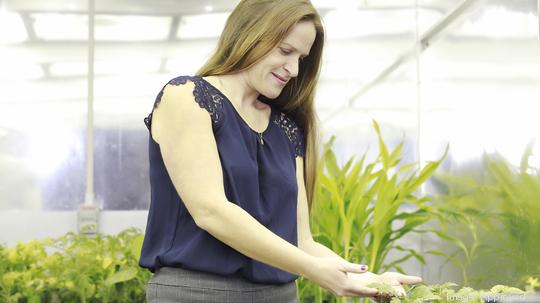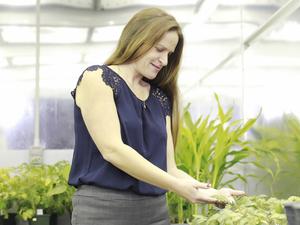
Davis-based InnerPlant is collaborating with satellite company Satellogic Inc. to get its imaging technology in place to detect crop signals from space.
Satellogic (Nasdaq: SATL) builds and operates commercial-grade satellites that perform Earth observation in real time for a variety of industries and governments.
“Better data directly from plants gives farmers the tools they need to increase yields while reducing chemical inputs," said Shely Aronov, CEO and founder of InnerPlant, in a news release.
InnerPlant has developed technology that allows plants to signal farmers optically about their condition.
"Modern farming taking place on such a vast scale ⏤ with many farms in the thousands of acres ⏤ makes satellite detection a critical way to collect data affordably," she said.
Satellite detection has always been the plan for InnerPlant to be able to monitor large farms, said company spokesman Sean Yokomizo. "This is that coming to fruition. It's a big traction indicator."
A satellite fitted with specially designed imaging equipment should launch aboard a SpaceX Falcon 9 rocket in the fourth quarter this year, he said. The first satellite will calibrate and validate the ability to image from space, and eventually, there will be a network of satellites that will be able to monitor crops globally.
The company is beginning drone-based aerial testing this spring.
When crops with traits developed by InnerPlant are in distress, they fluoresce in lighter images when viewed through a filter, whereas healthy plants remain dark. Plants fluoresce in different colors depending on the stressors, such as pest attachment, nutrient deficiency, lack of water or fungal pressure.
That allows smart equipment to pinpoint areas that need treatment and treat only those spots, and not the entire field. The InnerPlant strains allow farmers to see problems quickly in the field, rather than waiting several weeks to see damage.
The InnerPlant technology should also cut down on the overapplication of fertilizers or pesticides.
The farmers can access the satellite information on their existing farm equipment technology platforms, Yokomizo said.
InnerPlant was founded in 2018, and it has about 18 full-time employees. It has an 8,000-square-foot lab in Davis and greenhouses in Woodland.
Last September, farm equipment giant John Deere led a $16 million funding round into InnerPlant, with participation from existing investors, Menlo Park venture capital firm MS&AD Ventures, TAU Ventures of Tel Aviv, Israel, San Francisco-based Bee Partners LLC and Palo Alto-based UpWest.
That funding brought the company to more than $22 million raised since its launch.
John Deere is a subsidiary of Moline, Illinois-based Deere & Co. (NYSE: DE), a farm equipment and heavy construction machinery manufacturer.
InnerPlant is developing traits to identify fungal pressure on soybeans, which is a major problem. It is also working on protecting plants from insect pressure as well as working on identifying the need for nitrogen fertilizer. Nitrogen is a problem because it's expensive and tends to be overapplied, which causes harmful runoff to water systems.





